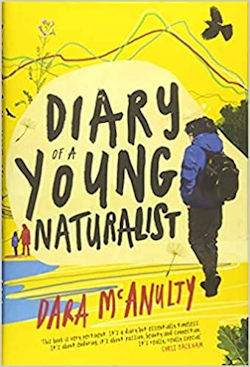SEJournal Online is the digital news magazine of the Society of Environmental Journalists. Learn more about SEJournal Online, including submission, subscription and advertising information.
BookShelf: “Diary of a Young Naturalist”
By Dara McAnulty
Text Publishing Co., $20.87
Reviewed by Melody Kemp
 |
I finished this book tucked up in a warm duvet, appropriately because the book is set in Northern Ireland. And I admit to closing it with a sigh, as it’s one of the most emotionally captivating books I have read for a while and certainly the most intimate.
At times I even felt too close to Dara McAnulty, a 16-year-old from Ireland who has autism. McAnulty describes himself as having “the heart of a naturalist, the head of a would-be scientist and the bones of someone already wearied against the apathy and destruction wielded against the natural world.”
His writing describes the love, awe, joy and — at times — a black rage he feels for his world, where “kids are invited to have a voice to share their ideas, hopes, dreams, and anguish, and then very little actually happens. The adults never dole out an invitation to sit down and plan things.”
For McAnulty, youths today “hand over our hearts beating on a platter for nothing. … Globally, we have lost 60 percent of our wild species since 1970. And it’s my generation that is labeled ‘apathetic,’ ‘self-indulgent,’ [and] ‘less focused.’”
It’s the adults, McAnulty writes, who continue to spend public money to destroy nature.
A cri de coeur for the environment
Greta Thunberg is the most recognizable and perhaps most dismissed of the younger generation’s activists. I have seen her described pityingly and contemptuously as ‘mad’ on social media.
McAnulty has courageously battled with
autism spectrum disorder to face crowds
and lead movements of young people to
confront the urgency of the issues facing us all.
So it is no surprise that she and McAnulty communicate. What is surprising is that the two have courageously battled with autism spectrum disorder to face crowds and lead movements of young people to confront the urgency of the issues facing us all.
McAnulty’s unashamed disclosure of his day-to-day battle with noise, crowds, attention and demands is compelling as is the love he feels and receives from his family.
As a clinical worker so many eons ago, I had autistic kids in my files, but at that stage little was known what a diagnosis of autism really meant.
McAnulty maps the roads, depressions, water holes and rocky promontories of his existence in painful detail, making his achievements even more impressive.
This book deserves to be read by all age groups, but I fear that it will be consigned to the young adult nonfiction shelves so adults will be spared the anger and the outrage of a young man growing up in a world that is being depleted of its biodiversity.
Adults need to read this cri de coeur as the environment is not a matter of simple objectivity, or even science, but of passion, fear and love.
McAnulty was just 14 when he started writing and 15 when he wrote the bulk of this incredibly erudite book.
How many teens that age use terms such as “vernal equinox” or can name polytrichum mosses, identify a plethora of birds, plants and insects, and — at the same time — have the courage to own up to imagining a suit of armor to cope with being a guest speaker?
All power to you Dara McAnulty.
Editor’s Note: On Sept. 8, McAnulty’s book won the United Kingdom’s 2020 Wainwright Prize for Nature Writing.
Melody Kemp is a longtime SEJ member and a freelancer currently located in Australia.
* From the weekly news magazine SEJournal Online, Vol. 5, No. 37. Content from each new issue of SEJournal Online is available to the public via the SEJournal Online main page. Subscribe to the e-newsletter here. And see past issues of the SEJournal archived here.

















